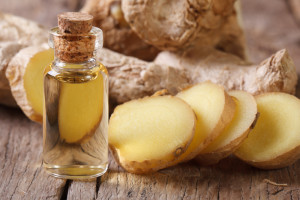Written by Angeline A. De Leon, Staff Writer. Chemotherapy –induced nausea and vomiting was significantly improved in cancer patients who took 200 mg of 6-gingerol prior to and continuing through their chemotherapy treatment compared to those cancer patients who took a placebo.
 The use of antioxidant supplementation with cancer patients receiving chemotherapy is controversial. While the number of clinical trials investigating the combined use of chemotherapy and antioxidant supplementation is limited, there is clear and consistent evidence indicating that administration of chemotherapy contributes to oxidative stress 1. This results in increased nitric oxide (NO) and lipid peroxidation products (formed by oxidative breakdown of lipids and linked to cellular damage) and lower blood levels of key antioxidants such as glutathione (GSH), catalase (CAT), and superoxide dismutase (SOD) 2-4. Consequently, various adverse side effects, such as nausea/vomiting and lung, heart, and kidney damage, may be experienced by chemotherapy patients 5. In vitro and in vivo studies suggest that the potent antioxidant activity of ginger, specifically its 6-gingerol component, may be effective in protecting against oxidative stress and improving certain chemotherapy-induced symptoms by increasing the activities of CAT and SOD 6. For example, ginger extract has been used to successfully treat symptoms of nausea and vomiting caused by chemotherapy-related production of free radicals in the gastrointestinal tract 7. To better understand how the antioxidant activity of ginger may potentially benefit cancer patients, researchers in Thailand (2017) conducted a clinical trial using ginger extract as a daily supplement with patients undergoing adjuvant chemotherapy.
The use of antioxidant supplementation with cancer patients receiving chemotherapy is controversial. While the number of clinical trials investigating the combined use of chemotherapy and antioxidant supplementation is limited, there is clear and consistent evidence indicating that administration of chemotherapy contributes to oxidative stress 1. This results in increased nitric oxide (NO) and lipid peroxidation products (formed by oxidative breakdown of lipids and linked to cellular damage) and lower blood levels of key antioxidants such as glutathione (GSH), catalase (CAT), and superoxide dismutase (SOD) 2-4. Consequently, various adverse side effects, such as nausea/vomiting and lung, heart, and kidney damage, may be experienced by chemotherapy patients 5. In vitro and in vivo studies suggest that the potent antioxidant activity of ginger, specifically its 6-gingerol component, may be effective in protecting against oxidative stress and improving certain chemotherapy-induced symptoms by increasing the activities of CAT and SOD 6. For example, ginger extract has been used to successfully treat symptoms of nausea and vomiting caused by chemotherapy-related production of free radicals in the gastrointestinal tract 7. To better understand how the antioxidant activity of ginger may potentially benefit cancer patients, researchers in Thailand (2017) conducted a clinical trial using ginger extract as a daily supplement with patients undergoing adjuvant chemotherapy.
A randomized, double-blind, placebo-controlled pilot trial was conducted using a group of 43 female patients (mean age = 52.4 years), all of whom were diagnosed with breast cancer and were receiving moderate-to-high emetogenic potential adjuvant chemotherapy. Patients were randomly assigned to ingest 20 mg of either standardized 6-gingerol or a placebo mixture daily, beginning 3 days before their first chemotherapy cycle and continuing through until the end of the fourth cycle. At baseline and at 1, 22, 43, and 64 days following chemotherapy treatment, researchers measured parameters of oxidative stress (lipid peroxidation products detected as malondialdehyde (MDA) and NO2-/NO3-) and antioxidant activity (quantified by levels of SOD, CAT, glutathione peroxidase (GPx), and total glutathione (GSH/GSSG)), based on blood samples provided by subjects.
Analyses indicated that at Day 64, parameters of antioxidant activity (SOD, CAT, GPx, and GSH/GSSG) were significantly increased for the ginger group vs. placebo (p < 0.0001). Indices of oxidative stress (MDA, NO2-/NO3-) also showed significant reduction with ginger treatment, in comparison to placebo (p < 0.0001). Relative to baseline, blood levels on Day 64 showed significantly higher antioxidant activity (SOD, CAT, GPx, and GSH/GSSG) (p = 0.01) and significantly reduced activity of oxidative markers (MDA, NO2-/NO3-) (p < 0.01).
Overall results support the antioxidant pharmacological effects of ginger, confirming the favorable role of ginger extract as a daily supplement for patients undergoing chemotherapy. Future work should focus on studying potential herbal-drug interactions and their impact on clinical outcome for cancer patients and other clinical populations.
Source: Danwilai K, Konmun J, Sripanidkulchai B, et al. Antioxidant activity of ginger extract as a daily supplement in cancer patients receiving adjuvant chemotherapy: a pilot study. Cancer Management and Research. 2017; 9: 11-18. DOI: 10.2147/CMAR.S124016
© 2017 Danwilai et al. Creative Commons Attribution – Non Commercial (unported, v3.0) License (http://creativecommons.org/licenses/by-nc/3.0/).
Click here to read the full text study.
Posted July 31, 2017.
References:
- Deavall DG, Martin EA, Horner JM, Roberts R. Drug-induced oxidative stress and toxicity. Journal of toxicology. 2012;2012.
- Gupta A, Srivastava S, Prasad R, et al. Oxidative stress in non‐small cell lung cancer patients after chemotherapy: Association with treatment response. Respirology. 2010;15(2):349-356.
- Srivastava AN, Gupta A, Srivastava S, et al. Cisplatin combination chemotherapy induces oxidative stress in advance non small cell lung cancer patients. Asian Pac J Cancer Prev. 2010;11(2):465-471.
- Amin KA, Mohamed BM, El-Wakil MAM, Ibrahem SO. Impact of breast cancer and combination chemotherapy on oxidative stress, hepatic and cardiac markers. Journal of breast cancer. 2012;15(3):306-312.
- Marx W, Ried K, McCarthy AL, et al. Ginger—Mechanism of action in chemotherapy-induced nausea and vomiting: A review. Critical reviews in food science and nutrition. 2017;57(1):141-146.
- Prakash UN, Srinivasan K. Gastrointestinal protective effect of dietary spices during ethanol-induced oxidant stress in experimental rats. Applied Physiology, Nutrition, and Metabolism. 2010;35(2):134-141.
- Thamlikitkul L, Srimuninnimit V, Akewanlop C, et al. Efficacy of ginger for prophylaxis of chemotherapy-induced nausea and vomiting in breast cancer patients receiving adriamycin–cyclophosphamide regimen: a randomized, double-blind, placebo-controlled, crossover study. Supportive Care in Cancer. 2017;25(2):459-464.
